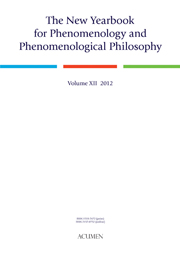Book contents
- Frontmatter
- Contents
- Articles
- Three Levels of Historical Analysis in Early Heidegger
- Heidegger's Schematism of Life and its Kantian Inheritance: A Critical Appraisal
- Husserl's Mereological Semiotics: Indications, Expressions, Surrogates
- Process and Relation: Husserl's Theory of Individuation Revisited
- Mathesis Universalis and the Life-World: Finitude and Responsibility
- Multiplicity, Manifolds and Varieties of Constitution: A Manifesto
- Phenomenology in the United States
- Documents
- In Review
Mathesis Universalis and the Life-World: Finitude and Responsibility
from Articles
- Frontmatter
- Contents
- Articles
- Three Levels of Historical Analysis in Early Heidegger
- Heidegger's Schematism of Life and its Kantian Inheritance: A Critical Appraisal
- Husserl's Mereological Semiotics: Indications, Expressions, Surrogates
- Process and Relation: Husserl's Theory of Individuation Revisited
- Mathesis Universalis and the Life-World: Finitude and Responsibility
- Multiplicity, Manifolds and Varieties of Constitution: A Manifesto
- Phenomenology in the United States
- Documents
- In Review
Summary
Abstract: Scientific philosophy has a “critical” meaning, from the first-person perspective, and a “dogmatic” meaning, from the third-person perspective. “Objectively” oriented philosophy finds its highest degree of rationalization in symbolic thought, and ultimately in a mathesis universalis. Although its development entails a depletion of its meaning-fundament in the life-world, it serves the purpose of compensating for the finitude of human cognition. Yet critical philosophy, not satisfied with this “natural” orientation, interrogates the essential origin of every positive formal science in finite experience. Husserl's relative concept of evidence is not a skeptical one and does not exclude the idea of “truth in itself.” His “transcendental relativism” refers to the self-responsibility of the radical scientific philosopher bent on the resolution of “all conceivable problems in philosophy,” in an ongoing teleological process of infinite tasks.
Keywords: formalization, critical phenomenology, life-world, philosophical self-responsibility, mathesis universalis
The Twofold Sense of Scientific Philosophy
For Husserl scientific philosophy ultimately has a twofold sense. On the one hand, it is developed within a “subjective” or first-person perspective and is radical or “critical” insofar as it attempts to disclose the philosophical origin of the positive sciences. Thus, it seeks to clarify both how their concepts, laws, and theories, as well as their objects, can become manifest “for us” if they are essentially “in themselves” and how, entering the flux of lived experience, they can be thought, expressed, and applied to experience without thereby losing their objectivity and transcendent meaning.
- Type
- Chapter
- Information
- Publisher: Acumen PublishingPrint publication year: 2013

